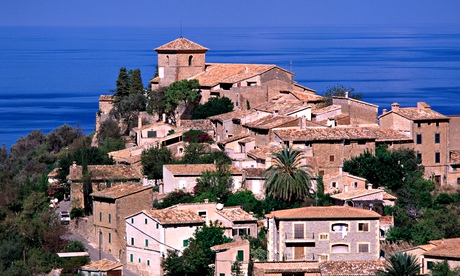
The unprecedented success of the 50 Shades trilogy, and the rise of a subgenre revoltingly termed "mummy porn", much of which was excruciatingly awful, has given erotic fiction for women a bad name in recent years. It's refreshing, then, to find a writer as fiercely talented as Helen Walsh turning her hand to a richly sensual story of forbidden lust as psychologically substantial as it is sexy.
This is not the first time Walsh has written frankly about sex; her acclaimed debut novel, Brass, followed the wild, self-destructive sexual adventures of her teenage heroine through Liverpool's clubland and back streets. Ten years on, The Lemon Grove offers a different perspective on female sexuality. Jenn, a woman on the cusp of middle age, finds herself unexpectedly drawn to her teenage stepdaughter's new boyfriend on a family holiday in Mallorca. Where Brass was bold, exuberant and often deliberately shocking, here Walsh's portrayal of desire is more nuanced, tempered by restraint and self-awareness. Though there are explicit scenes, she maintains a fine balance between description and suggestion; an exchange of glances can carry more erotic charge than a full-frontal exchange of fluids, and she builds the sexual tension step by slow step, teasing the reader.
The landscape of Mallorca, particularly the rocky north-west coast around the "arty" resort of Deià, is vital to the atmosphere of the novel, for this is the kind of affair that can only happen when reserved English people are taken out of their natural habitat – "under the glare of the sun, none of it seems real". The hot, heavy air; the turbulent mountain weather; the vivid scents and tastes; the abundance of exposed, sun-warmed skin – all these contribute to a heightened physical awareness that allows Jenn to shrug off propriety, to cross the line and abandon herself to the demands of her body. Walsh clearly knows the terrain well and renders it in precise, evocative detail; the earth, rock and water of the island seem intimately connected with the elemental desires unleashed in Jenn. When 17-year-old Nathan takes her hand for the first time, "His touch feels like hot, wet earth."
But The Lemon Grove is not a romance; rather, it is a complex novel about family relationships and growing older. The illicit attraction between Jenn and Nathan is only one of several faultlines running deep between the four inhabitants of the Villa Ana. Jenn and her husband, Greg, are struggling to come to terms with 15-year-old Emma's sudden transformation into a sexually active young woman; Greg is manfully hiding a secret to protect his family; Emma asserts herself by rejecting Jenn's mothering. Into this volatile situation Nathan arrives as a virtual stranger: a cocky, working-class boy newly conscious of the power of his own beauty.
Older women who fall for much younger men rarely fare well in fiction and drama and the consequences are often devastating – think of Bathsheba in Zoë Heller's Notes on a Scandal, or Betty in Neil LaBute's In a Forest Dark and Deep. Too often they are made to look foolish, even pitiful, once their ardent young lovers predictably drop them for girls their own age. After the initial frisson, Jenn's relationship with Nathan quickly turns darker. But while it is clear that he is arrogant and manipulative, Jenn herself is hardly innocent. She walks open-eyed into the affair – "she despises what she is, what she's doing" – knowing that the double betrayal would shatter her family.
Nathan is less convincing as a character; the more interesting relationship is the fraught step-parent dynamic between Jenn and Emma, which Walsh handles with delicacy as it fractures before the reader's eyes.
The Lemon Grove has the potential to be an enormous summer hit. It is taut and lyrical; steamy, tender and full of insight. Like the Australian writer Nikki Gemmell before her, Walsh has proved that literary fiction and erotica need not be mutually exclusive.

